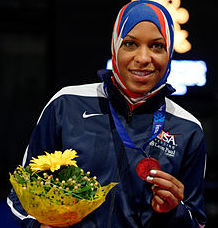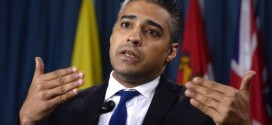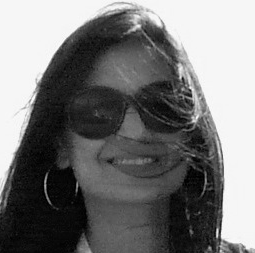
Ibtihaj Muhammad, At the 2013 World Fencing Championships/ photo by Marie-Lan Nguyen
Neither a Burqa nor a Bikini
Zehra Mehdi-Barlas
Yes, I was fortunate enough to be born in a country and into a family where it was expected for me, a girl, to get educated and have a voice. I was told that praying is good for the soul, but so is music. I was encouraged to read and learn more about the world. I was neither expected to cover my head nor asked to wear a burqa nor given a teeny-weeny yellow-polka-dot bikini to run around in. I was taught respect -- for myself and for others. I was expected to learn how to drive. I was taught that if I work hard, I can do anything. And when I wanted to marry someone from another sect, I was not beaten or stoned to death; all that my parents were concerned about was whether he would be able to take care of their spoiled daughter.
Yes, I am very fortunate. You see, I was born into a Muslim family in Pakistan. "Wait, hold on," you might say. "What? Are you serious? You must be one of the lucky ones, the anomaly." Well, no, I am not. There are many others like me -- in fact, "many" is an understatement -- but do you really want to know we exist? We are not women who have been treated miserably and written books on it; we are not prominent Muslim scholars delivering lectures; we do not post a daily apology for actions by people we cannot relate to. (How many Germans tweet that they are sorry for the Holocaust?) Isn't it boring to know about us? We can have peaceful protests condemning everything that you condemn as well, but where is the news factor in this? How will O'Reilly get ballistic or Maher find evidence to support his belief that Islam is essentially evil?
Yes, I was born in Pakistan. Do you know not to lump me with all women from Pakistan who have faced problems? There are thousands of those, but then there are thousands of us as well. But nobody is interested in our story anyway. There are the Malalas, whom we are so incredibly proud of, but there are also women like us. No matter how many stomach aches we feigned, we still had to go to school. Our fear was not what would happen to us if we attended school but what would happen if we didn't. We do exist as well.
Yes, there are many problems currently facing Muslims. In so many countries, religion is used for power and politics, taking the form of intolerance and violence. There is extremism that is unfortunately prevalent in certain places. But are you really interested in knowing that I am as appalled by the extremist beliefs as you are, that there are others who think like me? You say you want us to condemn their thoughts, but when we do, do you even hear of it? You want us to apologize, but what do we apologize for? How can we apologize for people whom we neither relate to nor agree with nor have anything in common with? While we are it, should we also apologize for Red Bull not giving you wings?
Yes, you can find multiple Islamic texts where war and violence have been mentioned. But you can find even more texts where the concepts of peace and respect have been propagated and given more importance than war. I am not a religious scholar, so I will not quote any, but all you have to do is search on Google and you can find them. Do you want to find them, though? Wouldn't it just be more interesting to read about death and gore? All religious texts have promulgated violence at one time or another, but all religions place basic humanity before anything else as well. Why would you even pause to think of that? After all, all 1.6 billion of us are running around saying -- screaming -- "Death to all!"
Yes, 9/11 incurred terrible losses. It was an inhumane act that ended 3,000 innocent lives. It should never have occurred. Neither should the half-million Iraqi deaths in the war, nor the 20,000 Afghan civilian casualties, the 416 to 951 civilian deaths in Pakistan caused by U.S. drone strikes, or the killings of 1,462 Palestinian civilians in just two months by Israeli forces. But do I, as a Muslim, believe that their deaths justify more deaths and violence? No. Do you believe that I believe in peace? Do you know that many women who wear the burqa do believe in nonviolence and are standing up to fight against injustices as well? Just because someone is wearing a burqa of their own choice does not mean they do not have progressive thoughts -- just like someone in a bikini can still be narrow-minded in some ways. What do you want us to do? Run to the rooftop every day with our first cup of coffee and scream out our condemnation?
Yes, I am just an ordinary Muslim. I do not have the chance to appear before any TV camera and tell you not to include me in your vast generalizations about Muslims. Even though Ben Affleck will forever be my Batman, and the likes of Jon Stewart, Nicholas Kristof, and Reza Aslan will forever be on my hard-to-reach A list, I am tired of hearing claims that all 1.6 billion of us believe in the same ideology, or that those of us who don't should make ourselves heard. How do you want us to do that? We are here. You see us every day. We are the ones shopping for groceries where you do, wondering whether the organic apple is worth the extra money. Our kids attend the same schools as yours; they are told to work hard, and they know better than to get a bad grade. We watch the same sports, and our sons, like your sons, develop a religious-type passion for fantasy football. We go to work, pay our taxes, attend concerts and eat at restaurants without blowing these places up. Why don't you see us, the ones who are visible everywhere?
 العربي الديمقراطي The Latest From The Arab World
العربي الديمقراطي The Latest From The Arab World





